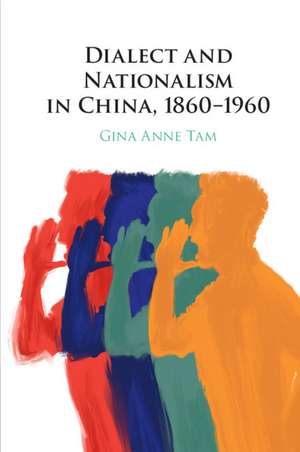Dialect and Nationalism in China, 1860–1960
Autor Gina Anne Tamen Limba Engleză Paperback – 29 sep 2021
| Toate formatele și edițiile | Preț | Express |
|---|---|---|
| Paperback (1) | 284.39 lei 6-8 săpt. | |
| Cambridge University Press – 29 sep 2021 | 284.39 lei 6-8 săpt. | |
| Hardback (1) | 695.06 lei 6-8 săpt. | |
| Cambridge University Press – 4 mar 2020 | 695.06 lei 6-8 săpt. |
Preț: 284.39 lei
Nou
Puncte Express: 427
Preț estimativ în valută:
54.42€ • 58.19$ • 45.37£
54.42€ • 58.19$ • 45.37£
Carte tipărită la comandă
Livrare economică 18 aprilie-02 mai
Preluare comenzi: 021 569.72.76
Specificații
ISBN-13: 9781108745697
ISBN-10: 1108745695
Pagini: 275
Dimensiuni: 152 x 229 x 15 mm
Greutate: 0.37 kg
Editura: Cambridge University Press
Colecția Cambridge University Press
Locul publicării:Cambridge, United Kingdom
ISBN-10: 1108745695
Pagini: 275
Dimensiuni: 152 x 229 x 15 mm
Greutate: 0.37 kg
Editura: Cambridge University Press
Colecția Cambridge University Press
Locul publicării:Cambridge, United Kingdom
Cuprins
Introduction; 1. A Chinese language: Fangyan before the twentieth century; 2. Unchangeable roots: Fangyan and the creation of a national language; 3. The sounds of authenticity: defining linguistic modernity in Republican China; 4. The people's language: Fangyan under the CCP; 5. The Mandarin revolution: the great leap to a standard language; Epilogue.
Recenzii
'Tam's groundbreaking book transforms our understanding of Chinese nationalism by establishing how fangyan have served as both targets for language standardization projects and resources for cultural diversity and communal sentiment. It also reconstructs the complex genealogy of Chinese linguistics as an academic discipline and reveals its fraught relationship to the modern state.' Robert J Culp, Bard College, New York
'Every scholar of Chinese society needs an understanding of how Mandarin became standardized as the national language and how local languages have nonetheless survived. Gina Anne Tam not only gives us that history but, importantly, demonstrates that the relationship between dialect and nation could have been different.' Sigrid Schmalzer, University of Massachusetts, Amherst
'Tam's impressive debut book provides readers with a theoretically sophisticated, clearly argued and gracefully written account of the complex relationship between language and nationalism in modern China. The author moves across a broad chronological and geographic canvass, making claims rooted in history and based on careful archive research. Though about the past, however, Dialect and Nationalism also speaks to issues making headlines now, at a time when struggles in which language and identity figure centrally play out everywhere from Catalonia to Hong Kong.' Jeffrey Wasserstrom, University of California, Irvine
'... learned and thoughtful study ... ' Andrew J. Nathan, Foreign Affairs
'Every scholar of Chinese society needs an understanding of how Mandarin became standardized as the national language and how local languages have nonetheless survived. Gina Anne Tam not only gives us that history but, importantly, demonstrates that the relationship between dialect and nation could have been different.' Sigrid Schmalzer, University of Massachusetts, Amherst
'Tam's impressive debut book provides readers with a theoretically sophisticated, clearly argued and gracefully written account of the complex relationship between language and nationalism in modern China. The author moves across a broad chronological and geographic canvass, making claims rooted in history and based on careful archive research. Though about the past, however, Dialect and Nationalism also speaks to issues making headlines now, at a time when struggles in which language and identity figure centrally play out everywhere from Catalonia to Hong Kong.' Jeffrey Wasserstrom, University of California, Irvine
'... learned and thoughtful study ... ' Andrew J. Nathan, Foreign Affairs
Notă biografică
Descriere
Analyzes how fangyan (local Chinese languages or dialects) were central to the creation of modern Chinese nationalism.
